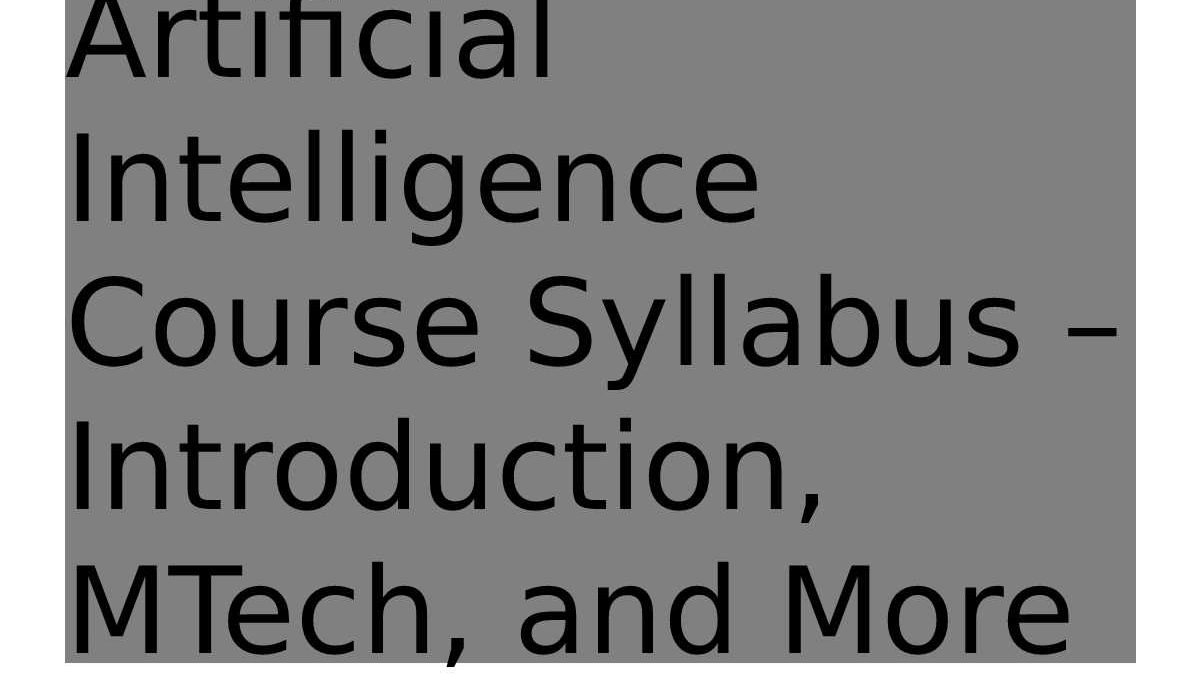Table of Contents
Artificial Intelligence Course Syllabus
The artificial intelligence course syllabus simulates human intelligence processes by machines, especially computer systems.
The Specific applications of AI include expert systems, natural language processing, speech recognition, and computer vision.
How does AI work?
As AI hype has accelerated, vendors have gone out of their way to promote how their crops and services use AI.
Often, AI is simply a component of AI, such as machine learning. The AI requires a foundation of specialized hardware and software to write and train machine learning algorithms.
No programming language is synonymous with AI, but some, including Python, R, and Java, are popular.
AI systems generally work by taking large amounts of labeled training data, analyzing the data for correlations and patterns, and utilizing these patterns to make predictions about future states.
This way, a chatbot that receives examples of text chats can learn to produce real connections with people, or an image recognition tool can learn to identify and describe objects in images by reviewing millions of examples.
The AI programming focuses on three cognitive abilities: learning, reasoning, and self-correction.
They are learning processes. This aspect of AI programming focuses on data acquisition and creating rules to turn data into actionable insights. The algorithms provide computing devices with step-by-step instructions on how to complete a specific task.
Cerebral processes. And also, this aspect of AI programming focuses on choosing the correct algorithm to achieve the desired result.
The Self-correction processes. This aspect of AI programming is designed to continuously fine-tune the algorithms to ensure they provide the most accurate results possible.
Artificial Intelligence Syllabus 2022
Here is the diverse Artificial Intelligence Course Syllabus taught commonly at all the course levels of study: Diploma, Undergraduate and Postgraduate.
Introduction to Artificial Intelligence – Introduction to Machine Learning
Introduction to Deep Learning Web Technologies
Database Management – Systems Programming
Discrete Structures – Computer Networks
Interface Technologies – Signal Processing
Introduction to Data Science – Computation Theories
Cryptography Internet of Things – (IoT)
Diploma in Artificial – Intelligence Syllabus
The detailed Diploma in Artificial Intelligence Syllabus is provided in the tabulation below:
Python Machine Learning and AI Frameworks – SQL
Machine Learning Foundations of AI and Machine Learning
Linear Algebra – Probability
Statistics – Essentials of Artificial Intelligence
Advanced Machine Learning with Deep Learning Plotting for Data Analysis:
Visualizing High-dimensional – Data Dimensionality Reduction
Deep Learning – Data Visualization and Analysis
Thesis Advanced Optimization Methods
BTech Artificial Intelligence Syllabus
Below is the tabular representation of the BTech Artificial Intelligence Syllabus, taught almost commonly in all the top institutions.
CAD and Drafting – Programming and Problem-solving
Introduction to AI – Advanced Physics
Engineering Chemistry – Mechanical Workshop
Discrete Structures – Computer Networks
The Design and Analysis of Algorithms – Software Engineering and Testing Methodologies
Principles of Operating System – Introduction to Biology for Engineering
Introduction to Deep Learning – Robotics and Intelligent Systems
OOPS, using JAVA – Management Studies
Web Technologies – Compiler Design
Theory of Computation – Neural Networks
MTech Artificial Intelligence Syllabus
A tabular representation of MTech Artificial Intelligence is provided in the table below:
AI and Artificial Neural Networks – Embedded Systems
AI-Based Programming Tools – Soft Computing
Knowledge Engineering and Expert Systems – Machine Learning
Human-Computer Interaction – Natural Language Processing
Image Processing and Machine Vision – Automated Reasoning
Signal Processing – Interface Technologies
Speech or Biometric Processing – Computational Intelligence
Agent-Based Intelligence Systems – Modeling and Simulation of Digital Systems
Problem-solving Methods – Cognitive Systems
Summer Internships – Projects

